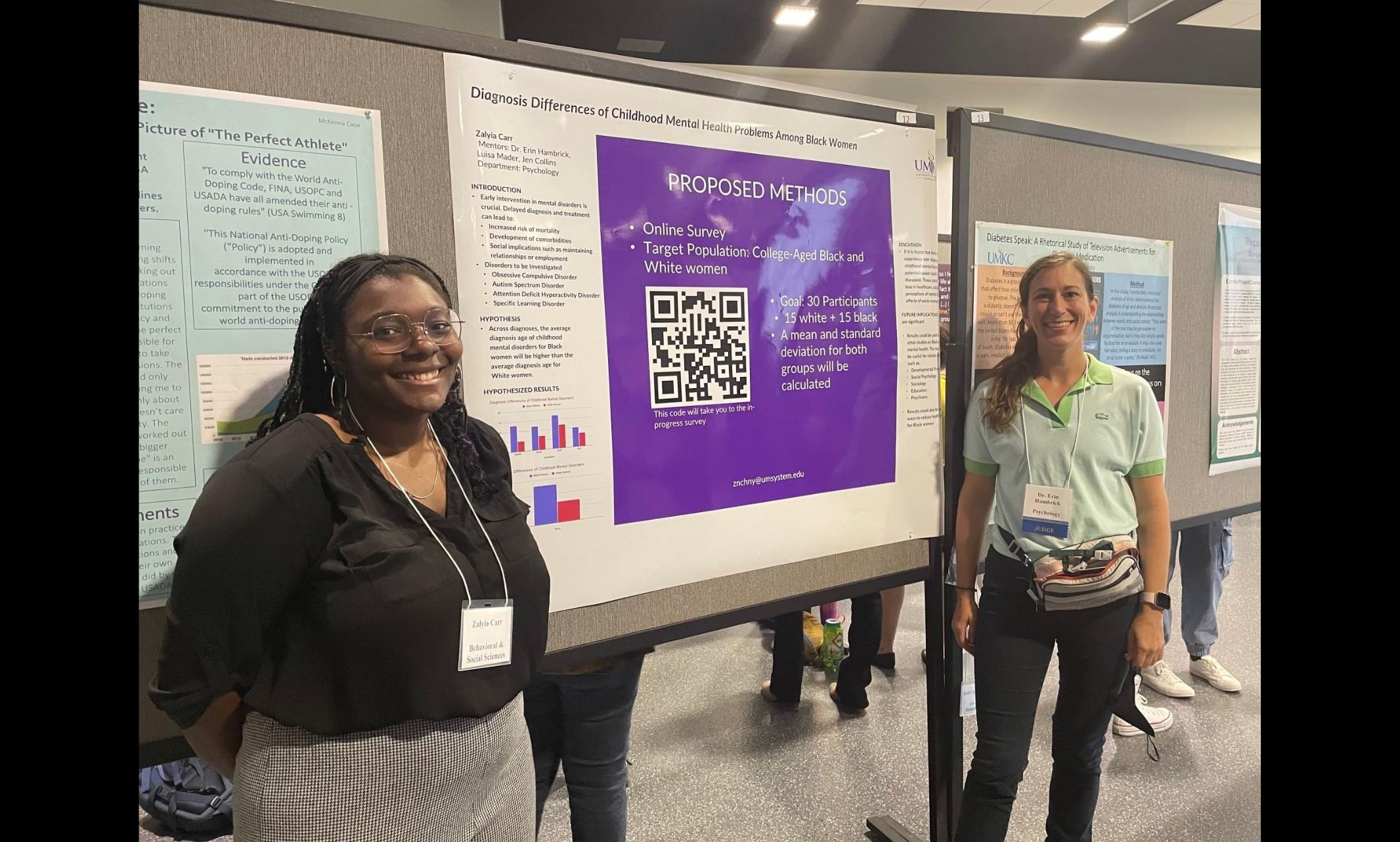
Erin Hambrick is changing the way we understand childhood trauma
Did you know people can experience growth after traumatic events? Erin Hambrick, Ph.D., is looking into how people have the ability go through trauma at a young age and all come out with different responses.
Last year, Hambrick’s work was chosen among hundreds of articles, and she was selected to be an inaugural speaker at Adverse Childhood Experiences (ACEs) Aware to discuss her paper. The ACEs Aware initiative is a first-in-the nation effort to screen patients for Adverse Childhood Experiences (ACEs) to help improve and save lives.
What is your area of expertise?
I’m a clinical child psychologist. I specialize in children’s exposure to adversity; specifically, how the timing, nature and severity of the negative experience can affect their development throughout the lifespan. I also study how positive experiences can be used to intervene and help children resume a more positive developmental trajectory.
What is the focus of your research?
My lab really zeroes in on how we can use what we know about what happened to a kid to inform how we might intervene. Some of what we do is longitudinal studies, where we’ll look and see what happened to kids and how it affects their long-term experience. We also work with therapeutic preschools and community-based agencies, to assess life experiences that kids have had. We help them understand what to expect in terms of how long treatments take, particularly what social supports and protective factors we really need to shore up for the child before we might expect the interventions to begin working.
What led you to this field of study?
Early in my study, I was really interested in the way people had the ability to experience hardship and get through it. Why is it that some people can go through really extreme circumstances and either come out okay, or even exhibit some growth? We obviously know that adversity and trauma can lead to many negative outcomes that we want to prevent, but it doesn’t always do that. So, I’ve been very interested in why is it that we have this differential response, and how we can learn more about it so that we can help more people get through traumas and adversities.
What is your research paper about?
An open question for some time has been the relative impact of when adversity happens during a child’s development. I think for a long time we really haven’t appreciated that severe, chronic and unrelenting stress even during the first few months of life is not only impactful but might be more impactful than stressors or experiences later. So, this paper was perhaps the first to show that chronic and unrelenting exposure to adversity during the first two months of life have a more pervasive and negative impact on children’s developmental trajectories than adverse experiences later in life.
What do you wish more people know about your research?
To me the number one message is how powerful, positive early life relationships can set children up for success. The most exciting part is that we are talking about stuff everyone can do. We’re talking about feeding a baby when its hungry, regulating a baby’s temperature and smiling at a baby when it wakes up. However, we probably will need some systems changed, to make those basic realities available to all children. I wish people knew just how important those early moments are but also just how capable we are as a society in doing what it takes to give kids a positive start.
Why is your research important to understand?
The reason why early exposure to extreme stress and relational poverty is so impactful is how fast our brains are developing in response to our environment in those early days. Our very first experiences set our neural “templates” for the way the world works. If we are bathed in stress in our early days, then our stress responses strengthen and grow while the parts of our brain that help us grow and develop are kind of put on hold. Therefore, with early life adversity and relational poverty, we often see global deficits in sensory processing, cogitation, self-regulation, other relational skills and more.
Feb 01, 2024
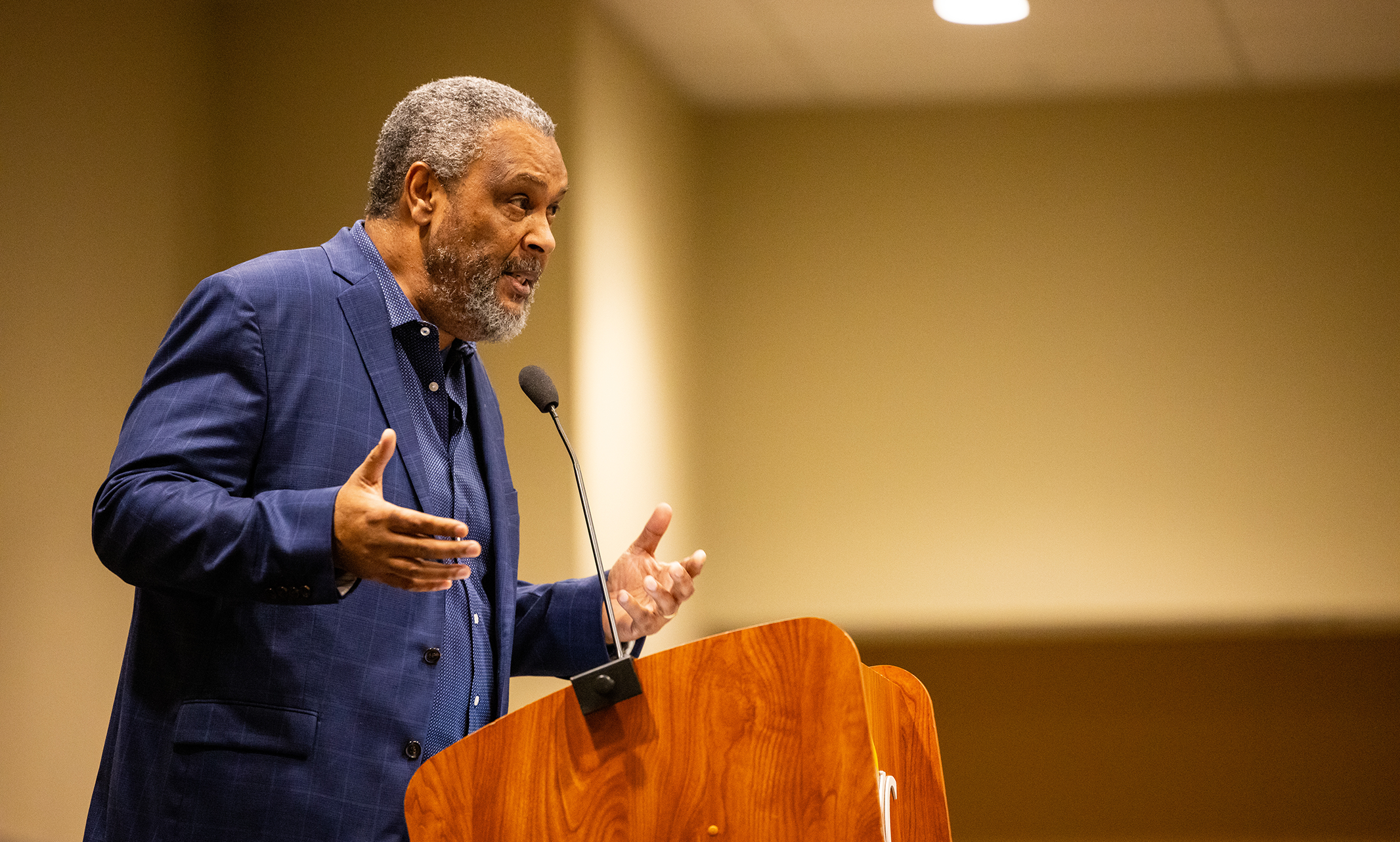
Kevin Willmott shares earlier history of ‘Becoming Martin’
Academy Award winner Kevin Willmott was the guest speaker for this year’s Martin Luther King Jr. Lecture.
Willmott, the writer of critically acclaimed films such as “CSA: The Confederate States of America,” “Chi-Raq” and “BlacKKKlansman,” spoke about how a young sociology student would become the Rev. Martin Luther King Jr.
Tamara Falicov, dean of the School of Humanities and Social Sciences, was excited to welcome back her long-time colleague for the 15th instance of this annual campus event.
“Kevin is an inspired filmmaker, with a collaborative spirit and dedication to this region,” Falicov said.
Based on the research conducted for his play “Becoming Martin,” Willmott shared the little-told history of King as a college student and the people around him, especially the minister Benjamin Mays and King’s own father, who inspired him to create a legacy that has inspired so many others.
“Anybody who achieves anything, it’s always about the people who helped you along the way,” Willmott said.
Students across UMKC came out to hear Willmott speak.
“I had heard of him as a filmmaker,” said Elliott Smith, an urban planning and economics student. “It’s great how he extrapolated the history to reflect the culture of the time and made it relatable.”
“I was impacted, as a younger listener, how he compared the tragedies of the 60s to modern tragedies we have experienced in our time,” said Taylor Trudell, a student in environmental science“The examples really put it all in perspective for how to get stuff done.”
The full lecture is available to watch online.
Jan 29, 2024
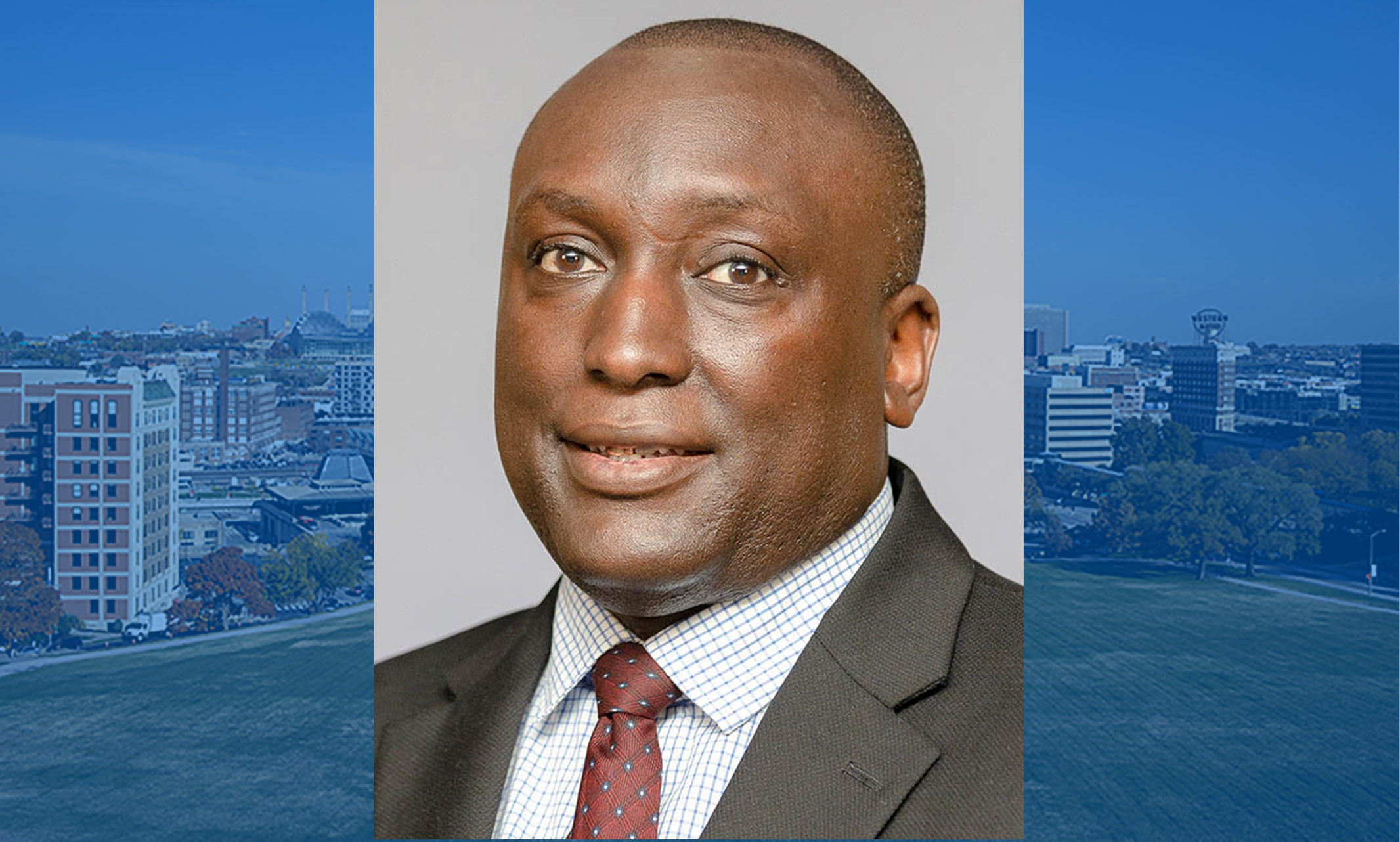
Henry Wash shares the impact his mentors had on him, and how he started High Aspirations
Each year, the UMKC Alumni Association recognizes outstanding alumni achievements with an awards celebration. Henry Wash (B.A., M.P.A) is the Class of 2024 Defying the Odds Award recipient.
Wash is the founder and Chief Executive Officer of High Aspirations (HA) and served as a mentor and board member of HA from 2003 to 2013. He has over 26 years of expertise in designing, implementing and evaluating programming for at-risk populations.
Wash’s educational accomplishments include an associate degree in applied science, associate degree in arts, bachelor’s in sociology, minor in Black studies and Master of Public Administration in urban affairs.
He overcame his circumstances in large part due to the mentoring he received from two prominent Kansas Citians, Henry W. Bloch and Thurman N. Mitchell, KCTV5. These two mentors have helped Wash identify his purpose in life. This led Wash to pursue his vision of making an impact on the Kansas City community, especially for young men. Wash is a current board member of Caring for Kids, Children’s Campus KCK, KC Common Good and Hawthorn Foundation.
What was the inspiration for High Aspirations?
HA was one of my research projects while attending the UMKC Henry W. Bloch School of Management in 2003. It was founded on evidence-based peer reviewed and empirical research from various backgrounds such as public administration, anthropology, sociology, higher education, psychology, Black studies and business. I walked away from a profession in the freight world to pursue my true calling in 2013 and have not looked back since. Today, we have the first mentoring campus for African American men in Kansas City. Our vision is to help make the world a better place.
How did UMKC prepare you for or contribute to your success?
I would not be where I am today without UMKC. My education gave me the foundation to gain experience and become the Henry Wash I am today.
What advice do you have for students who would like to follow in your footsteps?
Take your time. It has taken me 20 years. The sooner you pursue the purpose in your life, the better you’ll be.
Jan 25, 2024
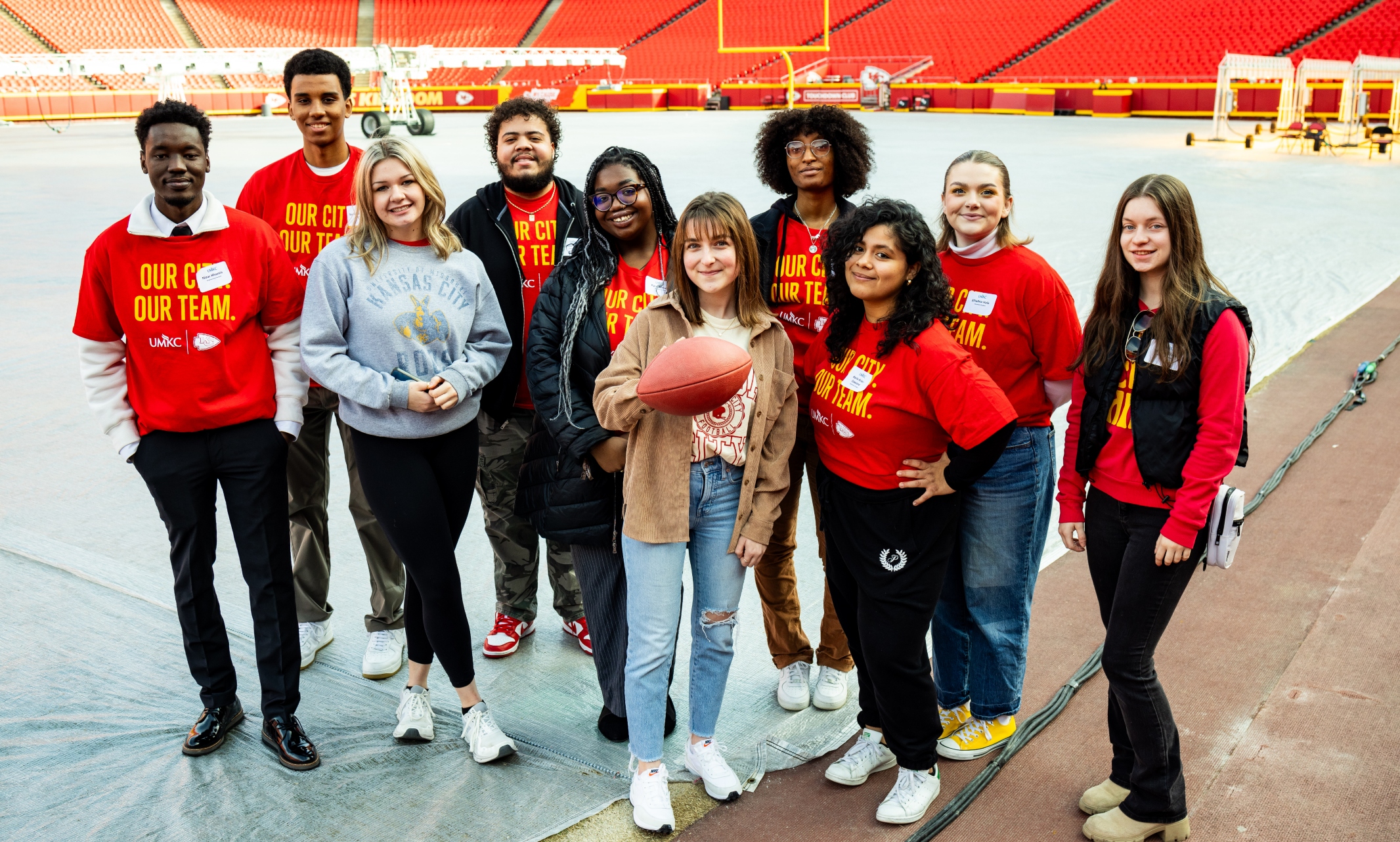
Stadium tours, job shadowing and leadership lunches are among the unique opportunities
Trying on Super Bowl rings and standing on the sidelines of GEHA Field at Arrowhead Stadium. This is a day in the life of a UMKC student with the university’s new partnership with the Kansas City Chiefs.
The partnership is focused on opportunities for students to learn from the Chiefs front office staff. During the first five months of the five-year partnership, students have attended several leadership lunches and a shadowing day at the Chiefs training facility. Also as part of the partnership, scholarships, internships and fellowships will be available exclusively to UMKC students. Students attending the leadership lunches and shadowing day have learned from a number of Chiefs staff members, including the chief financial officer, vice president of accounting, project director of manufacturing, engineering, plumbing and construction, vice president of player services and assessment, director of player engagement and more. “We’re giving an opportunity for students to understand all the different lines of work we do here and skillsets that our employees have,” said Kim Hobbs, Chiefs Vice President of Partnership Strategy and Development.
Student groups First Gen Roo, Professional Career Escalators and Men of Color Academy attended leadership lunches both on the UMKC campus and the Chiefs practice facility. Men of Color Academy is a cohort-based program that encourages academic achievement, leadership and personal growth. Program director JaVon Hill says that this partnership is a game-changer for students.“This dynamic partnership between UMKC and the Chiefs unlocks a world of possibilities for our students,” Hill said. “They are fortunate to be part of this unique relationship that will open doors to unparalleled access and networks, serve as a direct launchpad for empowerment, spark inspiration and fuel innovation all at the same time.”Students in the Professional Career Escalators program have benefited from these open doors, literally, with a shadowing day spent at the Chiefs practice facility and GEHA Field at Arrowhead Stadium. Students in this program – which emphasizes professional experiences in the health-care, education, business, engineering, law and justice fields – had unparalleled access to top-level staff members. Much of their time was spent in small groups with staff members to learn about their jobs and career fields and make valuable connections.Juan Owens attended the shadowing day just before graduating from UMKC with a bachelor’s degree in psychology. He spent the day with Shaun Tyrance, Ph.D., vice president of player services and assessment. In his role, Tyrance focuses on all aspects of behavioral health, wellness and performance psychology for all club employees, including players, coaches and staff. Owens said that the opportunity to talk with Tyrance was invaluable to his own career aspirations. Graduate school may be in Owens’ future, and he credits the shadowing day with helping define what that may look like.“I got to learn what exactly it is to be a sports psychologist,” Owens said. “I understand more what it takes to be that person and what I can do in my own community. Where I come from, there’s not a lot of resources, so this opportunity means a lot.”Beyond spending time with Chiefs’ front-office staff, the students enjoyed a behind-the-scenes stadium tour and learned about the history of the organization and the Hunt family. The opportunity to spend time at a world-championship organization is a lesson in success.“This opportunity to really engage with front-office leadership, learn about their career trajectories and connect with our students is powerful,” said Mako Miller, director of the Professional Career Escalators program. “Having such a recognized organization interact with our students in various ways shows a commitment to their career and leadership development. The Chiefs are providing this “behind-the-scenes” look at how an entity like a professional sports team operates and all that it takes to have a successful team.”
Jan 25, 2024
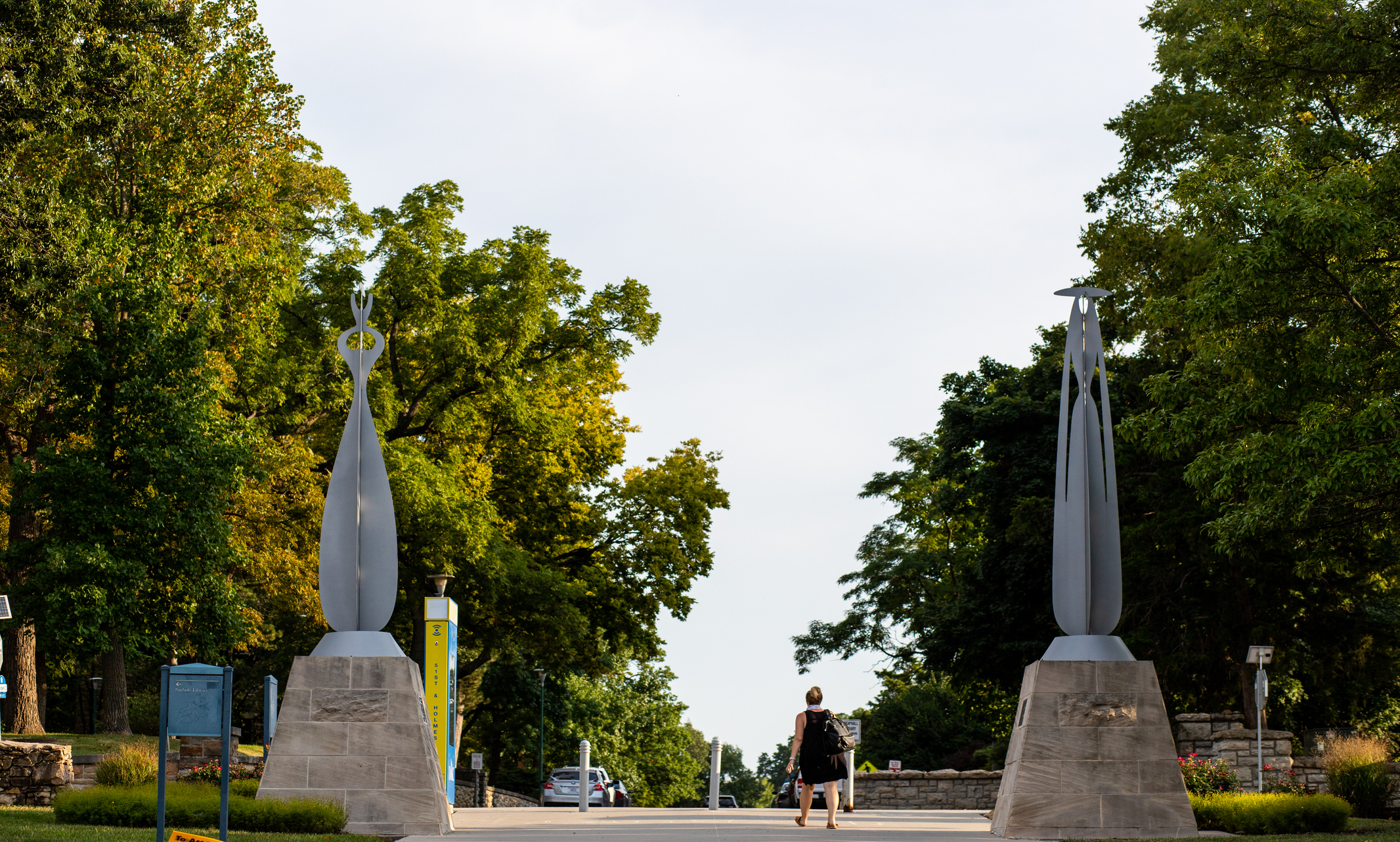
It’s written in the stars… and across the UMKC campus
Ever wondered where you are destined to spend time on campus? Look no further. Here’s a list of the zodiac signs as UMKC spots.
Aries: Swinney Recreation Center | March 21-April 19
Energetic and competitive, Aries are bound to feel fired-up after a workout at Swinney Recreation Center. The fire sign will also feel right at home with the sauna and steam room facilities.
Taurus: UMKC Dining Hall | April 20-May 20
Tauruses are known for enjoying the finer things in life, including food, environments and people. The UMKC Dining Hall encompasses all the above with its vast dining space and various food options.
Gemini: University Playhouse | May 21-June 20
The University Playhouse is home to lots of on-campus events, where Geminis will be able to express their sociable nature. Plus, the faces on each side of the building represent a Gemini’s intrinsic duality nature.
Cancer: Haag Hall | June 21-July 22
Cancers are known for being sentimental. A lover of history, they’ll especially appreciate the history behind the Don Quixote mural located in Haag Hall.
Leo: Student Union | July 23-Aug. 22
Always craving attention, a Leo is bound to run into someone they know at one of the busiest spots on campus. Ruled by the sun, Leos will also be pleased at the opportunity to bask in the sunlight at the Student Union rooftop.
Virgo: Miller Nichols Library and Learning Center | Aug 23.-Sept. 22
Ruled by Mercury, the planet of communication, it is only fitting for Virgos to be assigned the Miller Nichols Library. With four floors of varying noise levels, at least one floor is bound to meet their high standards.
Libra: The Quad (Blue and Gold Chairs) | Sept 23.- Oct. 22
The balanced nature of libra loves the quad, especially due to its convenient location to most classrooms and lecture halls. The blue and gold chairs also provide the sign known for being great conversationalists the perfect spot to chat with friends in between classes.
Scorpio: Diastole Scholars’ Center | Oct 23.-Nov. 21
Tucked away in the corner of the UMKC Hospital Hill Campus, the Diastole Scholars’ Center is as secretive as a Scorpio. Their mysterious aura pairs perfectly with the Diastole Scholars’ Center’s academia-inspired setting.
Sagittarius: Innovation Studio | Nov. 22-Dec. 21
The sign known for loving adventures will be able to escape reality at the Innovation Studio. From the AR/VR lab to the flight simulator, they will be able to indulge their free-spirited nature.
Capricorn: Atterbury Student Success Center | Dec. 22-Jan. 19
Known for being one of the most hardworking signs, Capricorns will be able to sharpen their academic skills at the Atterbury Student Success Center. Also known for being practical, they’ll be pleased at the various food and drink options available here, perfect for snacking in between study breaks.
Aquarius: James C. Olson Performing Arts Center | Jan. 20-Feb. 18
The James C. Olson Performing Arts Center offers various performances throughout the year, and at least one of them is bound meet an Aquarius’ eclectic and abstract taste.
Pisces: Warko Observatory | Feb 19.-March 20
Pisces will be able to Indulge their escapist nature with stargazing at the Warko Observatory. The sign known for being more on the introverted sign will be pleased at the opportunity to recharge their social battery at this quaint spot.
Jan 17, 2024
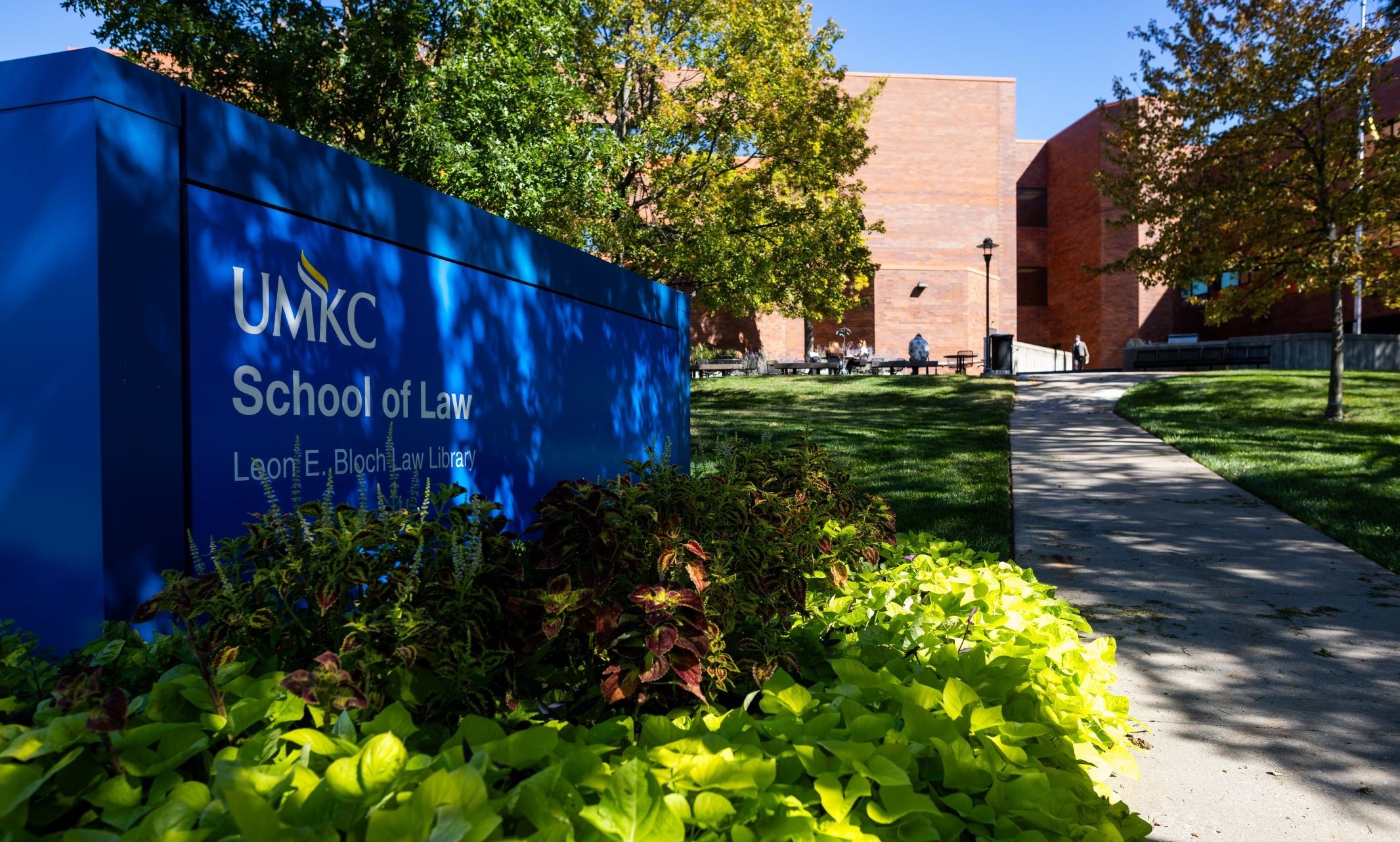
PreLaw magazine recognizes five programs for excellence
The UMKC School of Law was named a Best Value Law School by PreLaw magazine. Additionally, PreLaw recognized the law school as having five top programs: family law, trial advocacy, technology law, business law and tax law.
Schools recognized for being a Best Value Law School have favorable employment rates, bar passage rates and overall cost of attendance.
“Our goal isn’t to get our students to graduation, it’s to prepare them for everything that comes after that,” Lumen Mulligan, dean of UMKC School of Law said. “Providing value to our students means giving them the tools to pass the bar exam and have a successful career in law while trying to remove as many financial barriers as possible. Programs such as our new, all-inclusive bar prep program support success for all students, regardless of financial circumstances.”
This recognition isn’t just a point of pride. Breana Boger, director of admissions for the UMKC School of Law, says that these rankings are important to future law students when making the decision where to attend school.
“These rankings help communicate the caliber of our programs and success of our students,” Boger said. “It helps prospective students paint the picture for their own future success.”
The university’s location in the heart of Kansas City provides UMKC law students with numerous opportunities to get practical experience before graduation, including clerkships with judges, opportunities with federal and state government agencies, and internships with private law practices and organizations. Additionally, the law school operates several clinics, which give students experience and provide low-cost services to the community. Clinics include the Child and Family Law Clinic, Taxpayer Assistance Clinic, Expungement Clinic and Taxpayers Assistance Clinic.
That practical experience is just one of the reasons the UMKC School of Law was recognized as a top school for many of its programs. Students interested in family law, trial advocacy, technology law, business law or tax law will find valuable opportunities to learn both in and out of the classroom.
“We have outstanding faculty who are leaders in their fields and many alumni who come back to share their knowledge with students,” Mulligan said. “No matter what area of law a student wants to practice, they’ll find opportunities to learn and a community who wants to support them.”
Jan 16, 2024
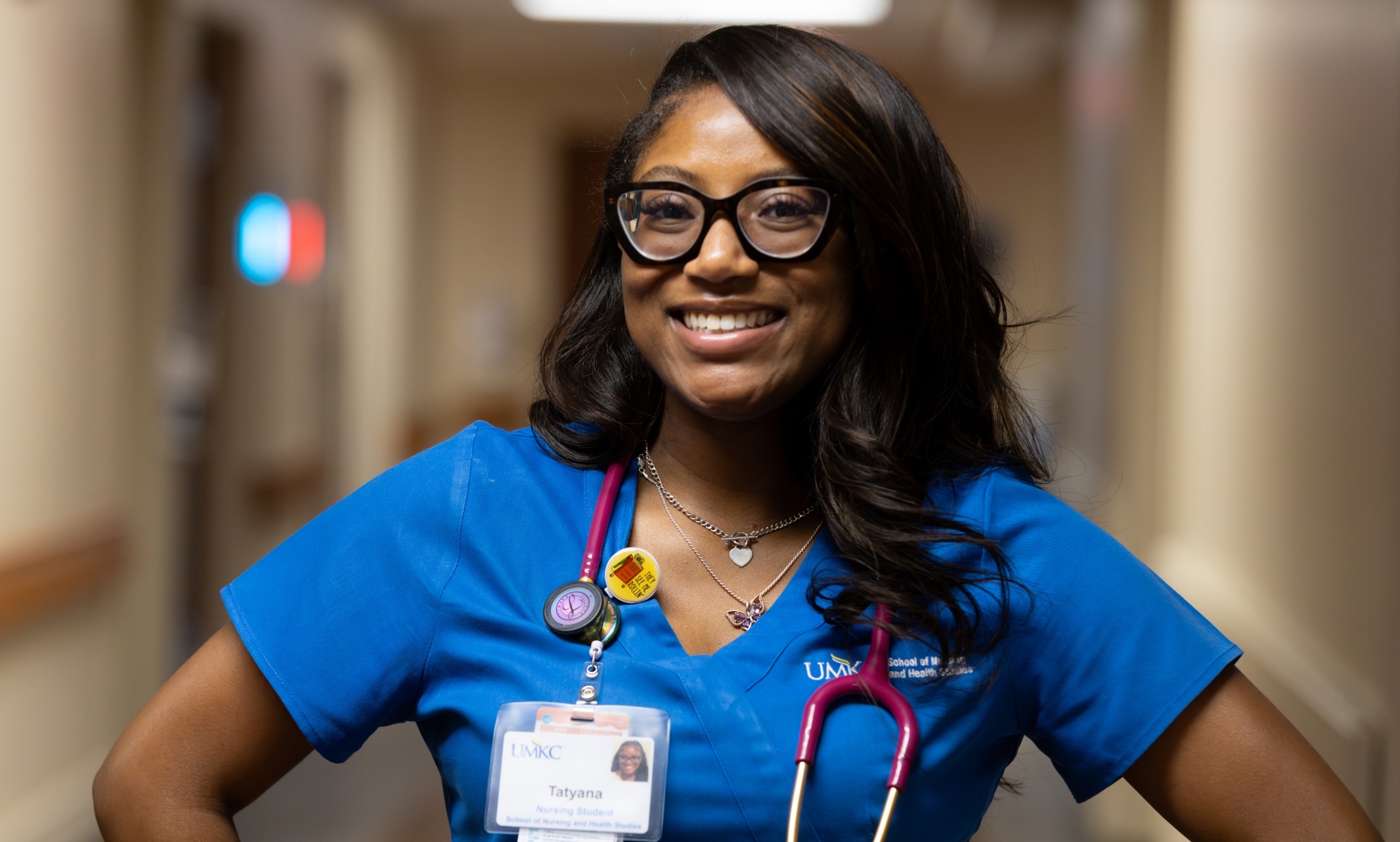
Tatyana Charles sought a second degree after finding her calling
In her clinical rotations at University Health, nursing student Tatyana Charles (B.H.S. '21) gets to practice exactly what she set out to do when she decided to pursue a nursing career.
“I feel grateful that I'm able to take care of my patients in their most vulnerable state to make them smile and take care of their immediate needs,” Charles said.
As a Kansas City native, Charles always knew she wanted to help her hometown neighbors. When she first came to the University of Missouri-Kansas City, that looked a little different. Charles pursued a bachelor’s degree in health sciences with plans to pursue a career in health administration. She later learned that her passion lied elsewhere.“I soon realized that I loved patient interaction and patient engagement, so I then chose to pursue nursing,” Charles said. She chose to remain at UMKC for her second degree because of the nursing program graduates’ high passage rate on the National Council of State Boards of Nursing (NCLEX-RN) exam. More than 98% of UMKC nursing students passed the board exam in 2022. Charles also felt confident that she would be supported because of the positive experience she had in the health sciences program.
Now Charles is working on post-surgical care rotation at University Health, an academic medical center dedicated to providing health care to the Kansas City community, both for those with insurance and without. She plans to pursue a career as an emergency room nurse after graduation, and feels certain of her skills. “I feel well prepared,” she said. “Our faculty teaches us what to expect and what abnormally can happen and what to do next.”
Working at a mission-driven hospital like University Health is the perfect fit for Charles, who not only wants to care for patients, but also wants to be an advocate for them and help them find ongoing resources to help them. “I tell people all the time that I have a passion to serve the underserved,” Charles said. “I want to be able to give knowledge to the local resources here in Kansas City to help the lower economic population.”
Jan 09, 2024
